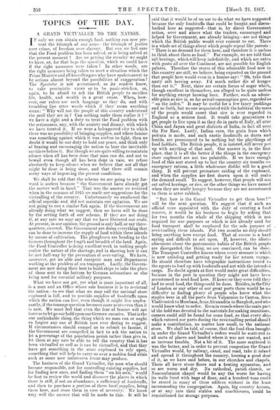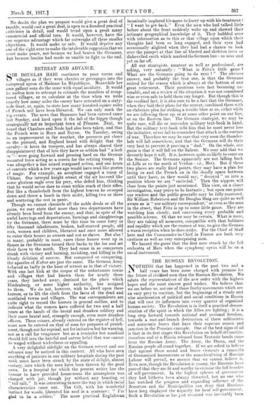TOPICS OF THE DAY.
A GRAND VICTUALLER TO THE NATION.
IF only we can obtain enough food, nothing can now pre- vent the triumph of our arms—the triumph of justice over crime, of freedom over slavery. But can we feel sure that the Food problem has been solved, or is being solved at the present moment ? Are we getting the security we ought to have, or, for that begs the question, which we could have if the right measures were taken ? In other words, are the right measures being taken to meet a situation which the Prime Minister and all his colleagues who have spoken assert to be serious almost beyond the possibilities of exaggeration ? The Spectator is not accustomed, as its readers know, to take pessimistic views or to be -panic-stricken, or, again, to be afraid to ask the British people to sacrifice life, health, and wealth in a great cause. When, how- ever, our rulers use such language as they do, and with trembling lips utter words which if they mean anything mean : " Why will not the people of this country understand the peril they are in ? Can nothing make them realize it ? " we have a right and a duty to treat the Food problem with the seriousness, nay, with the anxiety and dismay, with which we have treated it. If we were a beleaguered city to which there was no possibility of bringing supplies, and where famine was something against which it was useless to fight, then no doubt it would be our duty to hold our peace, and think only of bracing and encouraging the nation to bear the inevitable sacrifices before it. But though we arc quite willing to maintain silence when all has been done that man can do, and not to bewail even though all has been done in vain, we refuse absolutely to keep silence when we believe that not all that might be done is being done, and that there still remain many ways of improving the present conditions.
We shall be told that .the scheme we are going to put for- ward is useless because " the Government have already got the matter well in hand." That was the answer we received when in the summer of 1915 we made our suggestions for the victualling of the country. Unfortunately we swallowed the official soporific and did not maintain our agitation. We are not going to run a similar risk again. If the Government are already doing what we suggest, then no harm will be done by the setting forth of our scheme. If they are not doing it, at any rate we may say that we have liberated our souls. At present, in our opinion, the ground is only half, or say three- quarters, covered. The Government are doing everything that can be done to increase the supply of food within these islands by means of cultivation. The ploughmen are bending to the furrows throughout the length and breadth of the land. Again, the Food Controller is doing excellent work in making people realize the nature of the shortage, and in showing how it can be met half-way by the prevention of over-eating. We have, moreover, got an able and energetic man and Department working at the problem of sea transport. Lastly, the Govern- ment are now doing their best to build ships to take the place of those sent to the bottom by German submarines or else being used for essential military purposes.
What we have not got, yet what is most important of all, is a man and an Office whose sole business it is to revictual the nation—to see that what we may call the national store cupboard is full, and to provide supplies of foodstuffs upon which the nation can live, even though it might live unplea- santly, if the tonnage question becomes more acute even than it is now. We must feel that even the fear of famine will not force us to let go our hold upon our German enemies. That is the one unthinkable thing, the thing which no man can or ought to forgive any one of British race ever daring to suggest. If circumstances should compel us to submit to famine, if the Government are compelled in fact to ask the nation to let a percentage of the population perish rather than give in, let theni at any rate be able to tell the country that it has been victualled as well as it can be victualled, and that they have got something in the store cupboard to rely upon, something that will help to carry us over a. sudden food crisis such as some now unforeseen event may produce.
The business of the Grand Victualler, the man who should become responsible, not for controlling existing supplies, but for finding new ones, and finding them " on his own," would be first to review the world and discover the places in which there is still, .if not an abundance, a sufficiency of foodstuffs, and then to purchase a portion of these local supplies, bring them here, and store them in case of necessity. We know very well the answer that will be made to this. It will be said that it would be of no use to do what we have suggested because the only foodstuffs that could be bought and disem- barked em- barked here as suggested—that is, by direct Government action, over and above what the traders, encouraged and helped by Government, are already bringing—are not things which the British public would ever consent to eat. There is a whole set of things about which people repeat like parrots : " There, is no demand for them here, and therefore it is useless to think about them as food." For example, we are told that salt herrings, which will keep indefinitely, and which arc eaten with gusto all over the Continent, are not possible for English palates. Therefore the stores of this admirable food now in this country are still, we believe, being exported on the ground that people here would even in a famine say: " Oh, take that nasty salt herring away. l'd much rather die of hunger than eat it." Next, there are certain forms of sugar which, though excellent in themselves, are alleged to be quite useless: for anything except brewing beer. Further, such an admir- able grain as rice is, so far as real consumption goes, regarded as " on the index." It may be useful for a few fancy puddings and so forth, but no one acquainted with the habits of the mass. of the people would assert that rice is ever regarded in: England as a serious food. It would take generations to. get people to live upon it as they do in parts of Italy, all over China and Japan and great districts of India, in fact all over, the Far East. Lastly, Indian corn, the grain from which polenta is made, and such exotic foodstuffs as durra and lentils, are pronounced to be nothing but the playthings of food faddists. The British people, it is insisted, will never put up with anything of that sort. Our answer is, in the first place, that it is all the better if the things in the emergency store cupboard are not too palatable. If we have enough food of this sort stored up to last the country six months on emergency rations, a little wholesome dislike will be a good thing. It will prevent premature raiding of the cupboard, and when the supplies are first drawn upon it will make the demand small. To suggest, however, that people will not eat salted herrings, or rice, or the other things we have named when they are really hungry because they are not accustomed. to them is utter rubbish.
" But how is the Grand Victualler to get them here ?" will be the next question. We suggest that if such an official were appointed with the duty of creating a food reserve, it would be his business to begin by asking that for two months the whole of the shipping which is not required for war purposes or which is not already used for food transport shall be employed for the sole purpose of . revictualling these islands. For two months no ship should• bring anything here except food. That of course is a hard saying and difficult to act upon. If, however, the idiotic obsessions about the gastronomic habits of the iritish people. are disregarded, the thing, we are convinced, can be done. The Transport Controller knows where every steamer is which. is now unlading and getting ready for her return voyage. He should therefore have telegraphic instructions issued to the agents to load up with foodstuffs and not with the intended cargo. No doubt agents at first would make great difficulties, because in the port in question they might not have been accustomed to send food here. If however they were told they had to send food, the thing could be done. Besides, in the City of London or any other of our great ports there would be ne difficulty in finding plenty of people who knew what the staples were in all the ports from Valparaiso to Canton, from Vladivostok to Mombasa, from Alexandria to Bangkok, and who would know what to order. Even in vessels where the main part of the hold was devoted to the materials for making munitions, corners could still be found for some food, so that every ship. which entered our ports during the revictualling period should, make a contribution, no matter how small, to the national: store. We shall be told, of course, that the food thus brought. in under the Grand Victualler's orders would be scattered in all sorts of places and landed where it was not wanted, and so increase trouble. Not a bit of it. The more scattered it was the better, and in order to prevent congestion the Grand Victualler would, by railway, canal, and road, take it inland and spread it throughout the country, housing a good deaf of it, as we have said before, in our churches and chapels. These all have stone floors and a heating apparatus, and so are warm and dry. No cathedral, parish church, or Nonconformist chapel would be any the worse for having its walls lined with bags of flour, and a hundred tons could, be stored in many of these edifices without in the least incommoding the congregation. Again, big country houses, or at any rate their stables and coachhouses, could be requisitioned for storage purposes. No doubt the plan we propose would give a great deal of trouble, would cost a great deal, is open to a hundred practical criticisms in detail, and would tread upon a great many commercial and official toes. It would, however, have the one supreme advantage which far outweighs all these smaller objections. It would make us safe. It would deprive any one of the right ever to make the intolerable suggestion that we must make peace, not because we had beaten the Germans, but because famine had made us unable to fight to the end.



























 Previous page
Previous page